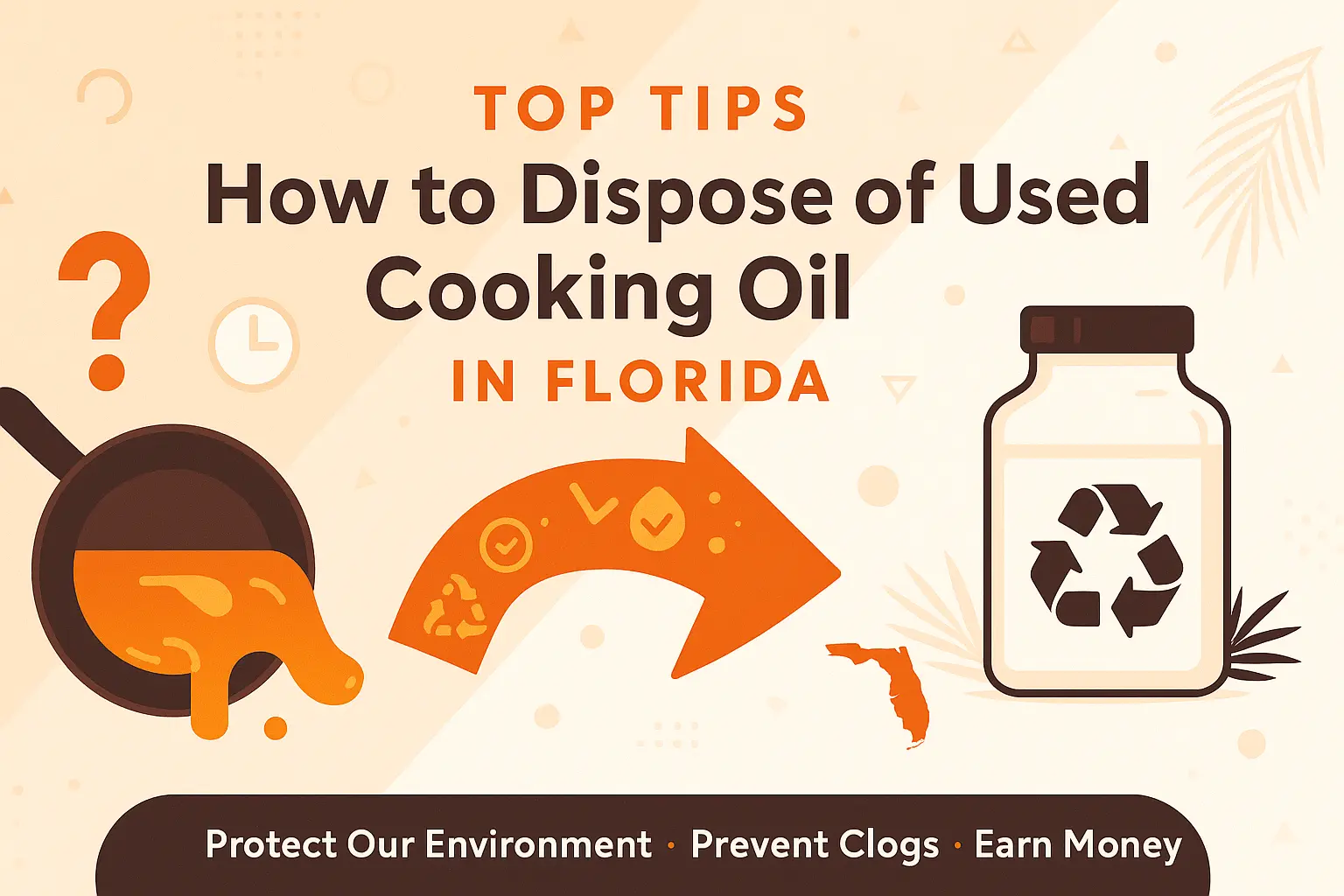Need to know how to dispose of used cooking oil in Florida? Proper disposal is crucial to prevent environmental damage and plumbing problems. This guide will explain easy and eco-friendly ways to get rid of your cooking oil, including local recycling options.
Key Takeaways
- Allow used cooking oil to cool before disposal, secure it in a leak-proof container, and check local regulations for proper disposal methods, including recycling options.
- Recycling used cooking oil at designated centers helps protect the environment by converting it into biodiesel and preventing water contamination.
- Avoid common disposal mistakes such as pouring oil down drains, which can lead to plumbing issues and environmental harm; instead, use local recycling programs.
Proper Disposal Methods for Used Cooking Oil
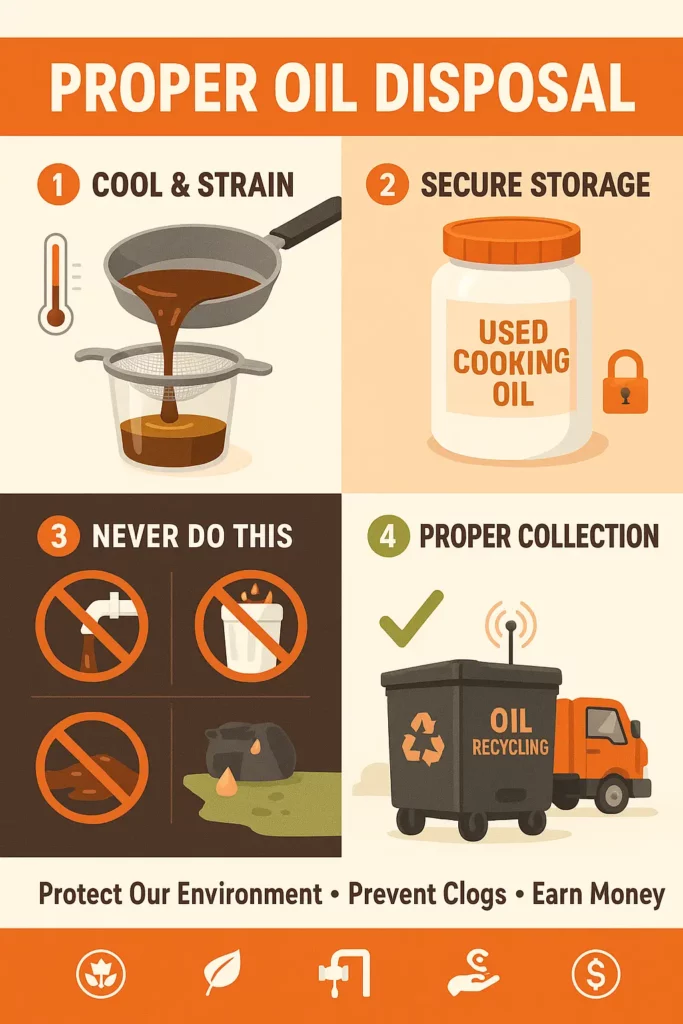
First, allow your used cooking oil to cool down before attempting any form of disposal. Allowing the oil to cool completely is important to avoid burns and ensure safe handling. Pouring hot oil into a trash can can cause significant damage, potentially melting the plastic and leading to leaks, which can be both a mess and a hazard.
Once cooled, you should carefully pour the oil into a sealed container, such as an old plastic bottle, jar, or even pots or other vessels before transferring it to a final disposal container. This method ensures that the oil is contained and won’t spill out, creating further issues. For best results, use a filter or cheesecloth to strain out food particles from the cooled oil before disposal or recycling, as this helps prevent rancidity and keeps the oil clean.
Another effective way to dispose of used cooking oil is by mixing small amounts of oil with absorbent materials like paper towels, yard waste, sand, or cat litter. This process:
- Solidifies the oil, making it easier to handle and dispose of as solid waste.
- Is particularly useful if you have a significant amount of oil to dispose of.
- Prevents leaks and minimizes mess.
Never pour used cooking oil down the sink, sinks, garbage disposal, or toilet, as this can cause plumbing clogs, blockages, and environmental harm. Also, do not dispose of oil on the ground, as it can contaminate soil and water, harming wildlife and causing pollution. Used cooking oil should not be mixed with other liquids before recycling or disposal to prevent spillage and facilitate proper recycling. FOG accumulates in the sewer system, similar to cholesterol in arteries, which can lead to serious blockages.
Be aware of local disposal regulations. Checking with your local waste management services can provide valuable information on how to properly dispose of cooking oil in your area. Some counties in Florida offer dedicated recycling programs that include used cooking oil disposal. These programs can often be accessed through local waste management websites, ensuring you’re following the correct disposal protocol.
For those who prefer a more eco-friendly approach, Florida offers several Public Used Oil Collection Centers where you can dispose of up to five gallons of used oil free of charge. These centers are part of the state’s effort to promote responsible waste disposal and recycling. Your local waste management services can provide information on scheduled pickup days for used cooking oil recycling, making it convenient to participate in these programs.
As a final tip, always wipe pans and dishes with a paper towel before washing to remove excess oil and help prevent clogs in your plumbing.
Recycling Used Cooking Oil in Florida
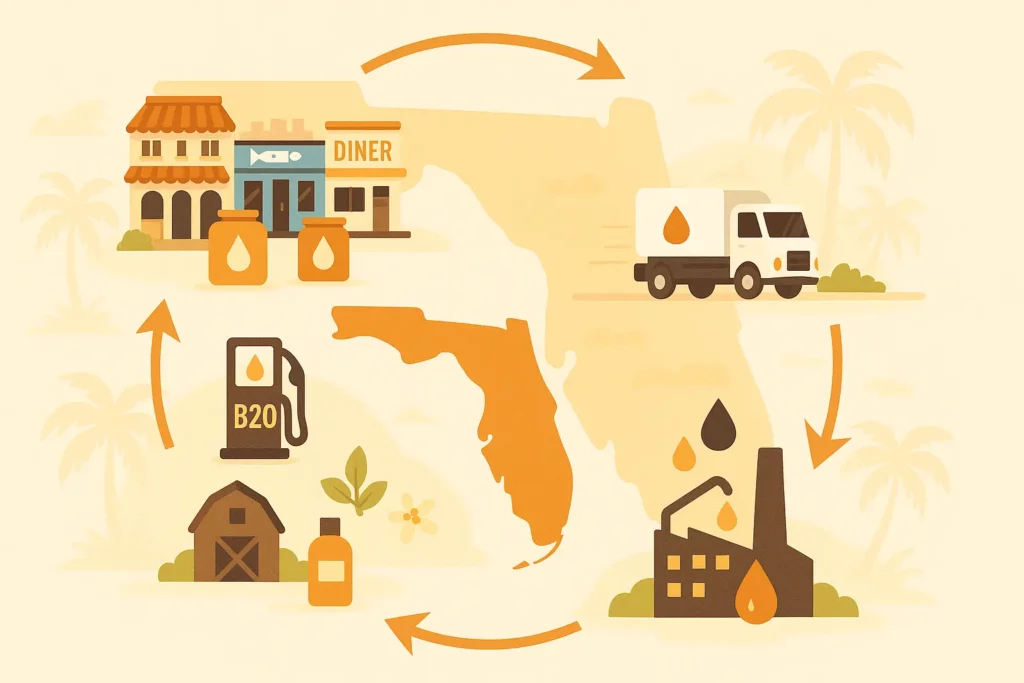
Recycling used cooking oil ensures that it doesn’t end up harming the environment. In Florida, many recycling programs are part of FOG (fats, oils, and grease) management initiatives designed to protect the sewer system and environment. Specific Home Chemical & Recycling Centers operated by the Solid Waste Authority accept used cooking oil for recycling. These centers are part of a highly successful used oil recycling program established in 1984, which is nationally recognized for its effectiveness.
The Florida Department of Environmental Protection encourages residents to use Public Used Oil Collection Centers, which permit the recycling of up to five gallons of used cooking oil free of charge. These centers have collectively recycled millions of gallons of used oil, demonstrating the program’s positive impact on the environment. The Solid Waste Authority accepts a variety of cooking oils, including canola, olive, and vegetable oils, ensuring that most types of residential cooking oil can be recycled.
Recycling used cooking oil offers significant environmental benefits by converting it into biodiesel, a sustainable fuel for diesel engines. By participating in these recycling programs, residents not only help protect the environment but also contribute to the creation of renewable energy.
Many communities in Florida have made it easy for residents to drop off their used cooking oil in leak-proof containers at designated recycling centers, promoting responsible disposal practices.
Safe Storage Solutions for Used Cooking Oil
Store used cooking oil properly to prevent rancidity and avoid attracting pests. Storing used oil in open containers can lead to unpleasant odors and even pose a fire risk. To minimize these risks, it’s best to store used cooking oil in its original container, which is designed to handle the contents safely.
To maintain a safe and clean storage facility area:
- Ensure the storage area is clean and secure to prevent spills.
- Keep the storage area tidy and place the container in a secure location to avoid messy situations and unwanted pests.
- Clearly label the container to prevent accidental misuse.
For those who frequently use cooking oil, such as deep fryer enthusiasts, consider the following tips for storing used oil:
- Use a dedicated container for storing used oil.
- Ensure the container is leak-proof.
- Choose a container that is easy to handle, making it convenient to transfer the oil for disposal or recycling later.
By following these storage tips, you can ensure that your used cooking oil is stored safely until it’s time for proper disposal.
Avoiding Environmental Damage
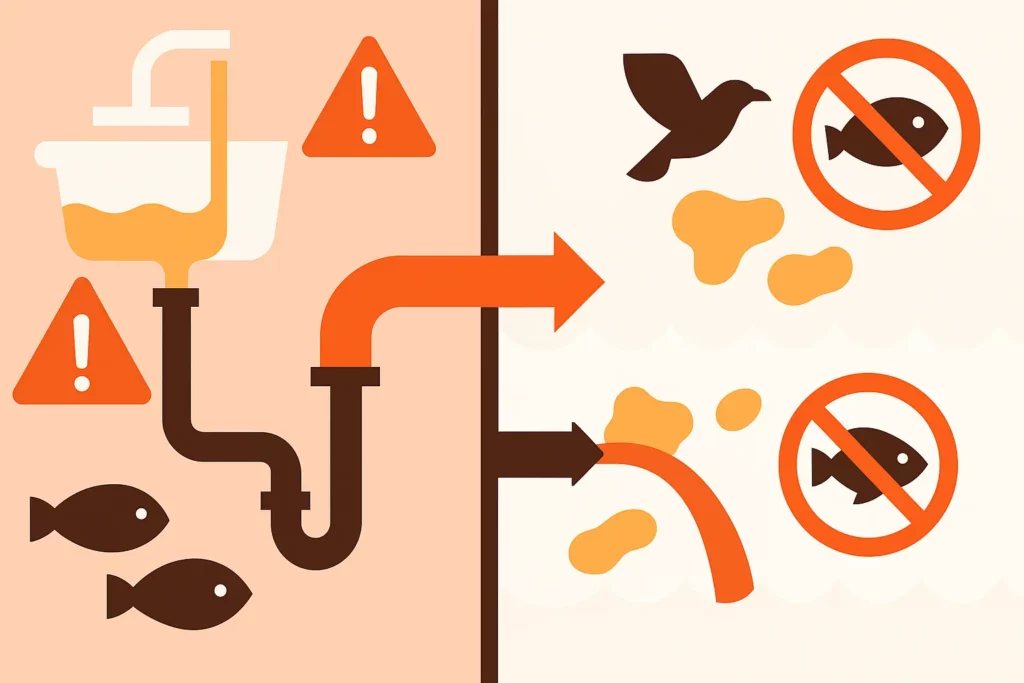
Improper disposal of used cooking oil can severely impact the environment. Improper disposal of food substances, such as used cooking oil, can also have a significant negative effect on the environment by polluting water sources and harming wildlife. Just five gallons of used oil can contaminate up to one million gallons of water if disposed of incorrectly. This highlights the importance of responsible disposal practices for both households and businesses.
Recycling used cooking oil prevents plumbing issues and allows the oil to be converted into biodiesel, an eco-friendly alternative fuel for diesel engines. The use of eco-friendly disposal methods can significantly mitigate environmental harm and promote sustainability. By recycling, we can turn waste into a valuable resource, reducing our dependence on fossil fuels and contributing to a greener economy.
It’s essential to avoid mixing cooking oil with other waste materials, as this can contaminate recyclables and complicate the waste processing. Proper disposal methods, such as using designated recycling centers or collection programs, ensure that the oil is handled correctly and doesn’t end up causing environmental damage. By adopting eco-friendly practices, we can collectively reduce the environmental footprint of our cooking habits.
Commercial vs. Residential Cooking Oil Disposal
Cooking oil disposal varies significantly between residential and commercial entities. Residential cooking oil disposal typically involves cooling the oil, placing it in a secure container, and taking it to a designated recycling center.
In contrast, commercial business entities, such as restaurants, generate larger quantities of used oil and must hire licensed grease haulers for proper disposal. Commercial cooking oil disposal often entails more extensive storage and collection processes. Restaurants commonly use outdoor tanks ranging from 100 to 400 gallons to store used oil, which recycling companies pump out regularly. Grease Connections provides used cooking oil pickup and recycling services for foodservice businesses, offering a reliable solution for managing large volumes of oil.
Indoor tanks, often vertical cylinders between 150 to 350 gallons, maximize kitchen or storage space and facilitate efficient oil collection. Additionally, even small amounts of ecotubs, holding 40 to 80 gallons, allow for easier storage and transport, reducing the risk of small amounts spills during disposal. Pans can also be used to create similar liquids purposes. Mahoney Environmental provides regular used cooking oil collection and recycling so your storage tank is never full, ensuring smooth operations for businesses.
Some restaurants partner with local oil recyclers, providing a convenient disposal option for residents as well. These partnerships allow residents to drop off their used cooking oil directly at participating restaurants, making it easier to dispose of oil responsibly and support local recycling efforts. Regular pickups help prevent spills and injuries as well as theft, ensuring a safer and more efficient recycling process.
Cleaning Up After Cooking
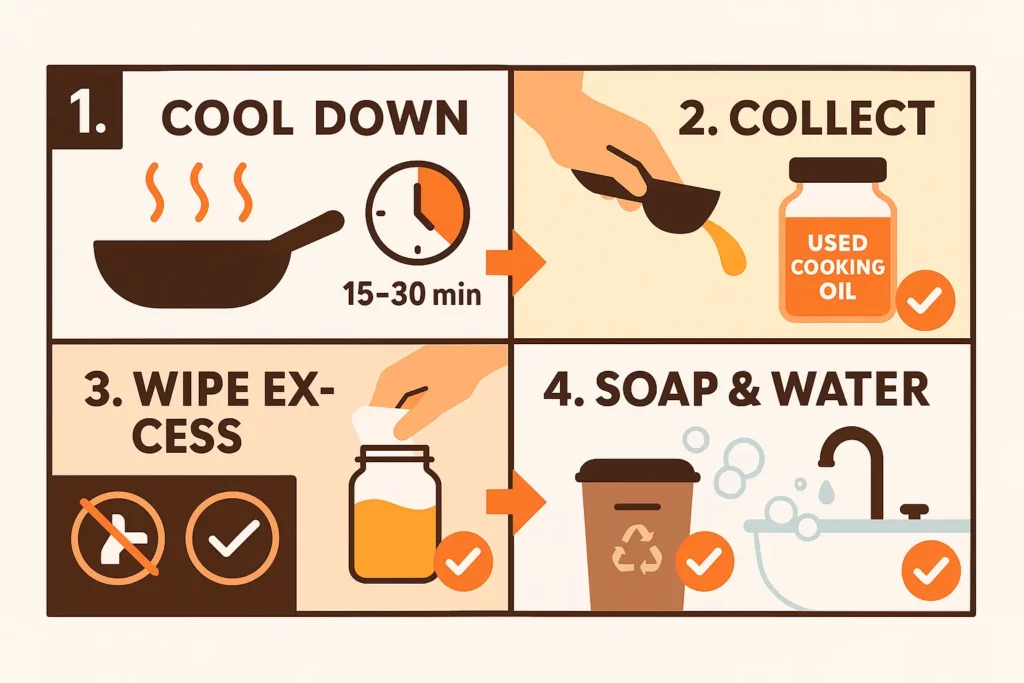
Cleaning up after cooking requires proper handling of leftover grease and oil to maintain kitchen hygiene. Using a dish soap specifically formulated to tackle grease can effectively remove stubborn residues from kitchen dishes that have been washed. Immediate rinsing of containers after use can prevent grease from hardening, making the cleaning process much easier. If needed, you can also scrape off any remaining residue for a thorough clean.
Natural cleaning agents and their uses for removing grease stains include:
- Baking soda mixed with water serves as an abrasive to eliminate tough grease stains.
- Soaking containers in a vinegar and warm water solution helps dissolve grease and neutralize odors.
- A combination of lemon juice and salt creates an effective cleaning paste for removing stubborn grease.
- Cornstarch can help absorb oil stains from plastic containers that absorb grease before washing.
Cleaning leftover grease and oil prevents unpleasant odors and maintains kitchen hygiene. Using hot water can help loosen grease in heat-safe containers prior to washing, ensuring that your kitchen remains clean and free from harmful residues. By following these cleaning tips, you can ensure a clean and pleasant cooking environment.
Maintenance Tips for Grease Traps
Grease traps are an essential component in both residential and commercial kitchens, preventing oil and grease from clogging the plumbing system. Different types of grease traps, including manual and automatic models, require varying maintenance routines, with automatic units often needing less frequent servicing. Regular maintenance is crucial to prevent clogs and ensure efficient functioning of the trap grease traps.
It is important to avoid using chemicals to clean grease traps, as they can kill beneficial bacteria needed for breaking down fats, oils, and grease, worsening the problem. Adhering to recommended maintenance schedules and using appropriate cleaning methods will help keep the grease traps in optimal condition, ensuring the smooth operation of your kitchen’s plumbing system.
Common Mistakes to Avoid When Disposing of Cooking Oil
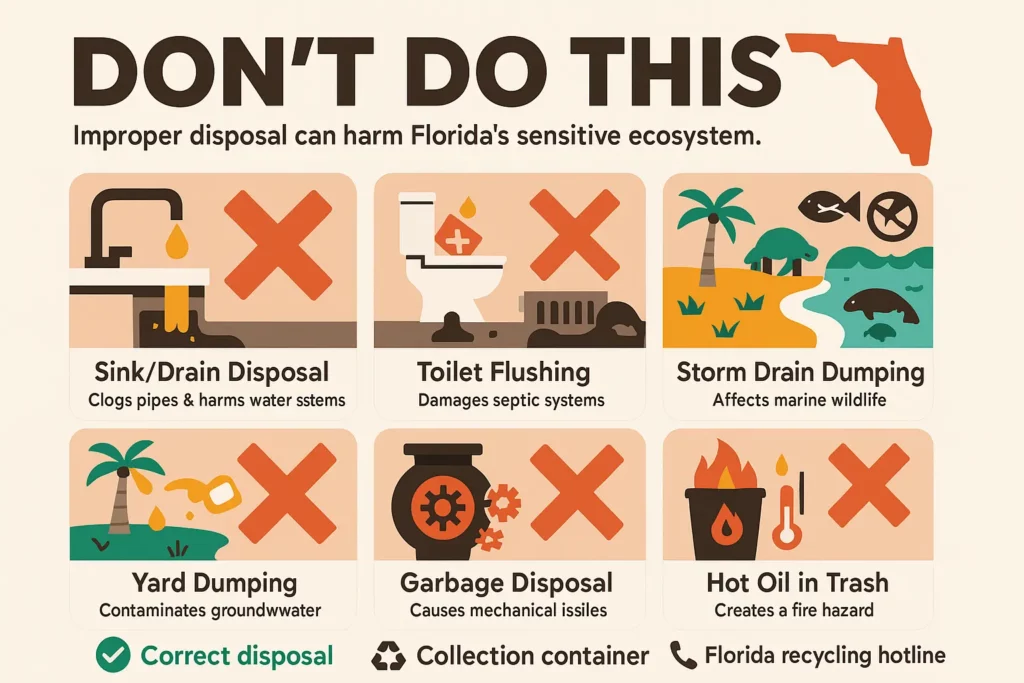
Improper disposal of used cooking oil can lead to significant plumbing and environmental issues. A frequent error is pouring used cooking oil down the drain or sinks, which can cause clogs in pipes and lead to costly repairs. When used cooking oil mixes with other materials in the sewer system, it can contribute to water contamination during overflow situations. The buildup of cooking oil in sewers leads to overflow during heavy rains. Additionally, oil can form a film on water surfaces, blocking oxygen necessary for aquatic life, which further harms aquatic ecosystems.
Pouring cooking oil down storm drains is particularly harmful, as these drains are not designed for waste disposal and can become clogged, negatively impacting the local water system. Oil poured down sinks can also enter the water system and cause pollution. The contamination of water sources can have far-reaching effects on both the environment and public health. When cooking oil is poured down storm drains, it exacerbates these issues.
Avoid these mistakes by following proper disposal methods, such as using designated recycling centers or secure containers for trash disposal. By being mindful of these common errors, you can ensure that your cooking oil disposal practices do not harm the environment or your plumbing system.
How to Contact Local Oil Recyclers in Florida
To find a collection center, check your city’s website or call your local waste management office.
- Online directories
- The Florida Department of Environmental Protection (DEP), which offers a list of registered Used Oil Handlers to assist residents
- Contacting the Used Oil Recycling Coordinator at the Florida DEP for additional guidance and information on disposing of used cooking oil responsibly.
Transporting used oil in a secure container to a recycling center or a restaurant that accepts oil is an environmentally friendly option. Many local oil recyclers in Florida provide drop-off locations, making it easier for residents to dispose of used cooking oil responsibly and support environmental protection efforts.
Summary
In summary, proper disposal of used cooking oil is essential for protecting our environment and maintaining efficient plumbing systems. By cooling the oil, using secure containers, and participating in recycling programs, we can ensure responsible disposal practices. Recycling used cooking oil not only prevents environmental harm but also contributes to the creation of biodiesel, a sustainable fuel.
Let’s commit to adopting these practices in our daily lives, ensuring that we contribute positively to our environment. By following the tips and guidelines outlined in this post, we can all play a part in promoting responsible cooking oil disposal and protecting Florida’s unique ecosystem.
Start Earning Today
Phone
Address
2217 N.W 7st, Miami, FL 33125
Hours of Operation
Mon – Sunday – 24/7

